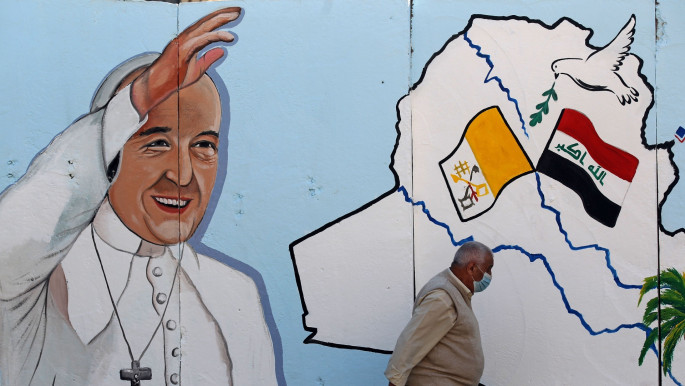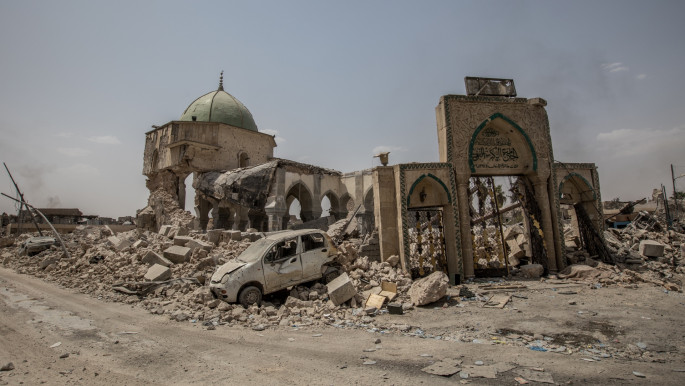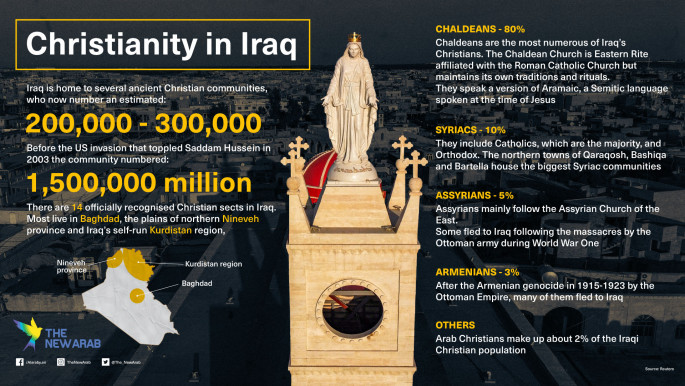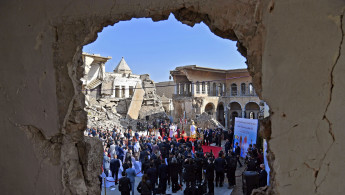Despite the Pope's visit, uncertainty reigns over the fate of Mosul and Iraq's Christians
Mosul, Iraq - When Pope Francis arrived at Church Square in the heart of Mosul's Old City, occupied by four churches from different denominations, joy and commotion filled the air.
Children held olive branches, while loud music accompanied the chants in Arabic and Italian of 'Santo Padre ti amiamo' ('We love you Holy Father'). Finally, there was a moment of celebration for a city that was devastated by indescribable horrors. But once the international media's attention subsided, there was little to celebrate.
To the left and right of the square, destroyed buildings bear witness to the cruelties of the past. The Al-Nouri mosque, where Islamic State (IS) leader Abu Bakr Al-Baghdadi proclaimed his 'caliphate' in early July of 2014, is not far away.
Mosul's Christians had to flee the city in 2014 when IS set a deadline for them to either convert to Islam, pay a tax, leave or be killed. The liberation of the city in 2017, which took over nine months, came at a high price. It left large areas in ruins, killed thousands of civilians and displaced more than 900,000 others.
Ali Baroodi, a resident of the city, tweeted, "The plants, trees and flowers that made Mosul quite colorful during the visit of @Pontifex were removed last night. This is not a simple thing. It tells a lot about the system and administration". When IS was defeated, Baroodi was active with other youth groups to help rebuild the city. He was also one of the organisers of the first ever TEDx Mosul events last year.
"This is Maydan: the most destroyed area of the city, I took pictures of it in 2018 and it still looks nearly the same. The objective of TEDx Mosul - 'Dream it Possible' - was precisely that: to give hope but not false hope," Baroodi, who lost his job at the University when IS took over the city, told The New Arab.
 |
Mosul is not what people think it is: it is not a terror zone, it is also a hope zone |  |
Despite all the damage, Baroodi believes that "Mosul is not what people think it is: it is not a terror zone. It is also a hope zone". The TEDx venue focused on youth and their role in post-IS Mosul, covering women's empowerment, entrepreneurship, media, humanitarian work and the arts. But youth work alone is not enough; the absence of government infrastructure and support to aid the city's reconstruction is evident for all to see.
 |
|
| Explainer: Why Pope Francis' historic visit to Iraq is so significant |
The absence of government is not something new for Mosul. The police avoided going to the old part of town even before IS. Mosul, which in Arabic means 'linking point', was, and still is, abandoned by the central government. UNESCO launched a project 'Revive the Spirit of Mosul' in 2018 and while some progress can be seen, the city still mostly lies in rubble.
An Iraqi proverb recites 'The day will wipe out the promises of the night' and for many who witnessed the extensive preparatory work that was done to welcome Pope Francis, it was just that.
It was the promise of what the city could be and of what could be done by the government in a relatively short amount of time to improve the city's basic infrastructure: from street lighting to planting flowers and trees, repainting buildings and paving the streets.
This wasn't only limited to Mosul. In Ur, the power generator that lit the Great Ziggurat site at night was back on a flatbed, the plants dug up and removed. Once the Holy Father left it appears these efforts were little more than a political façade exploited for upcoming elections in October, a 'promise of the night'.
 |
The problem I see now is for Christian refugees that have left the country. Once you are born elsewhere and start living in other countries, it becomes more difficult for the new generations to want to return |  |
In his speech in Mosul, the Holy Father noted "it is cruel that this country, cradle of civilization, has been hit by a tempest of inhuman proportions that destroyed religious sites and killed or made refugee thousands – Muslim, Christian, Yazidi and others…Despite this, we gather here today to say fraternity is stronger than fratricide, hope is stronger than death and peace is stronger than war".
Next to where the Pope sat for the ceremony, a white sheet covered a statue, a gift from the city. When it was unveiled a beautiful new cross appeared with an inscription plaque (in Arabic and English) 'How beautiful are the feet of the messengers of peace, in commemoration of the visit of His Holiness Pope Francis as a messenger of peace and fraternal love'. The young artist who made it, Omar Qays, who hails from Mosul, had difficulty holding back his emotions as he received a benediction from the Holy Father.
Archbishop Najib Moussa, who spoke to The New Arab, appeared hopeful for the future. "For us this is a resurrection across and despite the debris of destruction, the people of Mosul are united: all of them. Christians, Muslims, Yazidi all delighted for this visit," he said.
"This means there is life in the midst of the debris and churches without roofs. The cross you see was made by Muslims of Mosul, a new generation and it symbolises rebirth. However, we must work to help rebuild the city's people and its buildings that are still destroyed."
 |
|
| Mosul: A wounded city trying to heal |
The Archbishop used to manage the preservation of nearly 850 ancient manuscripts in Aramaic, Arabic and other languages, as well as 300-year-old letters and some 50,000 books. He transferred the archives to Qaraqosh in 2007 to protect them during the Islamist insurgency in 2007 when thousands of Christians fled the city. In 2014, when IS occupied Qaraqosh he filled his car with rare manuscripts, 16th century books and records as he fled east to Iraq's autonomous Kurdish region.
While the Archbishop exhibited a hopeful outlook, Père Rodolphe Vigneron, an Episcopal Delegate of the Pastoral Ministry for cultural relations and work for the East, was less optimistic. "This is indeed a historic moment. I have been coming to Iraq for the past twenty years; I saw it under Saddam Hussein and after 2003," he told The New Arab.
 |
For us this is a resurrection across and despite the debris of destruction, the people of Mosul are united: all of them |  |
While not endorsing in any way Saddam Hussein's regime, he added "for the Christian community under Hussein there were no threats. The problem I see now is for Christian refugees that have left the country. Once you are born elsewhere and start living in Europe or in other countries, it becomes more difficult for the new generations who have not ever even lived here to want to return, and the current situation does not make it easier".
The Christian community in Iraq dwindled significantly after the US-led invasion that toppled Saddam Hussein in 2003, from around 1.5 million to fewer than 500,000. After IS in 2014, over 125,000 were displaced.
 |
|
| Click to enlarge |
As the Pope left Iraq on Monday to return to the Vatican, amid intense feelings of hope among Iraqis, there was news of an attack in the Al-Kadhimiya area of Baghdad which wounded ten Shia pilgrims. The incident took place as tens of thousands of Shia pilgrims prepared to mark the death of Imam Musa Al-Kadhim, the seventh imam according to the Shia community, on Wednesday, the 25th of Rajab of the Islamic calendar.
We are left with the hopeful words of the Holy Father, who while visiting Qaraqosh said: "Your presence here is a reminder that beauty is not monochrome, but shines forth in a variety of difference. At the same time we look around with great sadness…how much has been torn down! How much needs to be rebuilt! Our gathering here today shows that terrorism and death never have the last word…You are not alone!"
Yet what the country needs lies much deeper, as young protestors have been demanding in the streets since 2019. Socio-economic intervention to improve the living conditions of Iraqis cannot be a promise that vanishes when day comes.
Gaja Pellegrini-Bettoli is a freelance journalist based in Beirut and focusing on the MENA region. Her articles appear in Al Jazeera, Middle East Eye, Al-Monitor, E.U. Observer, France24, Opendemocracy and the Atlantic Treaty Association.
Follow her on Twitter: @gajapell



